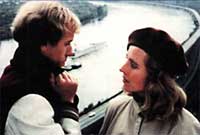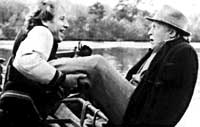1975
Director:
Wim Wenders
Screenplay:
Peter Handke
(based on Goethe's "Wilhelm Meisters Lehrjahre")
Director of Photography:
Robby Müller
Editor:
Peter Przygodda
Music:
Jürgen Knieper
Production Design:
Heidi Lüdi
Cast:
Rüdiger Vogler
Hanna Schygulla
Ivan Desny
Marianne Hoppe Peter Kern
Nastassja Kinski
Lisa Kreuzer
Festivals/Awards: 1975 German Film
Prize in Gold
(for Director, Screenplay,
Editor, Director of Photography, Music and Actors.)
Producers:
Peter Geneé
Wim Wenders
Production:
Wim Wenders
Produktion
Length:
104 min.
Format:
35mm Color
Original Title:
Falsche Bewegung
Original Language:
German |
|
Bonn,
a castle on the Rhine, a neighborhood on the outskirts pf Frankfurt
and finally Zugspitze are the stage in a journey that will free
your Wilhelm Meister from the gloominess and from the discouragement
oppressing him in his home town. He believes that it is only
by moving away from his mother that he can satisfy his yearning
to be a writer.
During the journey he meets an odd couple: an old vagrant singer,
Laertes, who is still struggling within himself against the
ghosts of his Nazi past and Mignon, a dumb girl; he falls in
love with the actress, Therese, and makes friends with the young
vagabond poet, Bernhard Landau.
This party, that spontaneously and quit by the chance
gather around Welhelm, very soon breaks up. After the old industrialist
who offers them hospitality for a night in his castle commits
suicide, Bernhard breaks away from the others.

Soon afterwards Wilhelm shakes off the vagrant singer, sickened
by his morbid searching into the past. In the end he also leaves
Therese, who goes to Italy together with Mignon. By now Wilhelm
has no other wish but to be alone and devote himself to his
writing. His journey ends on the Zugspitze.
This film represents a catastrophic poem in which the catastrophy
acquires its own grandeur. The entire film is based on the subtle
distinction between right and wrong.
We tried to avoid making Wilhelm and, in general, the other
characters, behave in an entirely just way. Even the relationships
between the characters are neither right nor wrong, but always
in equilibrium – even if they are never presented this way in
the film- between right and wrong. One moment it seems that
Wilhelm has acted in the right way, the next moment, it becomes
clear that he hasn’t realized it and destroys everything anew.
Hence the title Falsche Bewegung.

In Goethe’s Wilhelm Mesiter and generally in literature before
the Twenthieth century, the topos of travel is identified with
continuous change, with experience, with development. The entire
pedagogic novel (Entwicklungsroman) becomes unthinkable without
that topos. Traveling is equivalent to a search for identity.

|